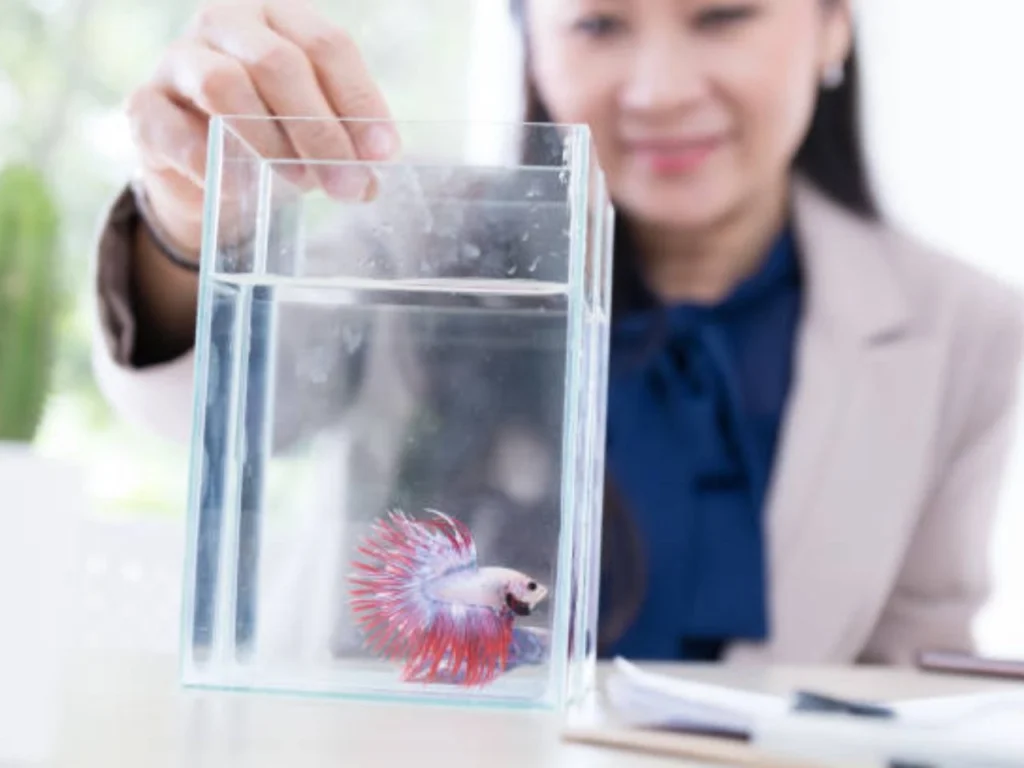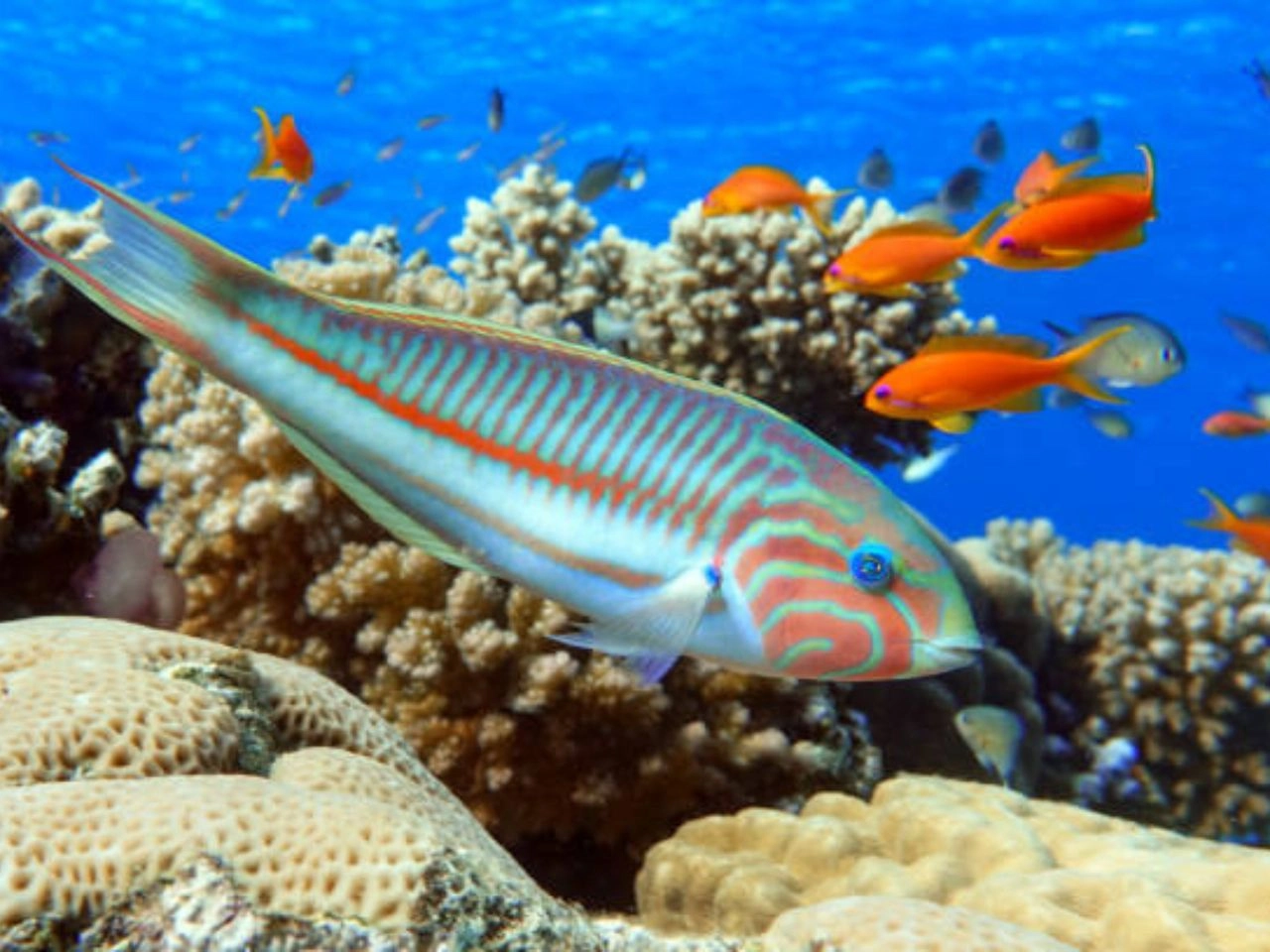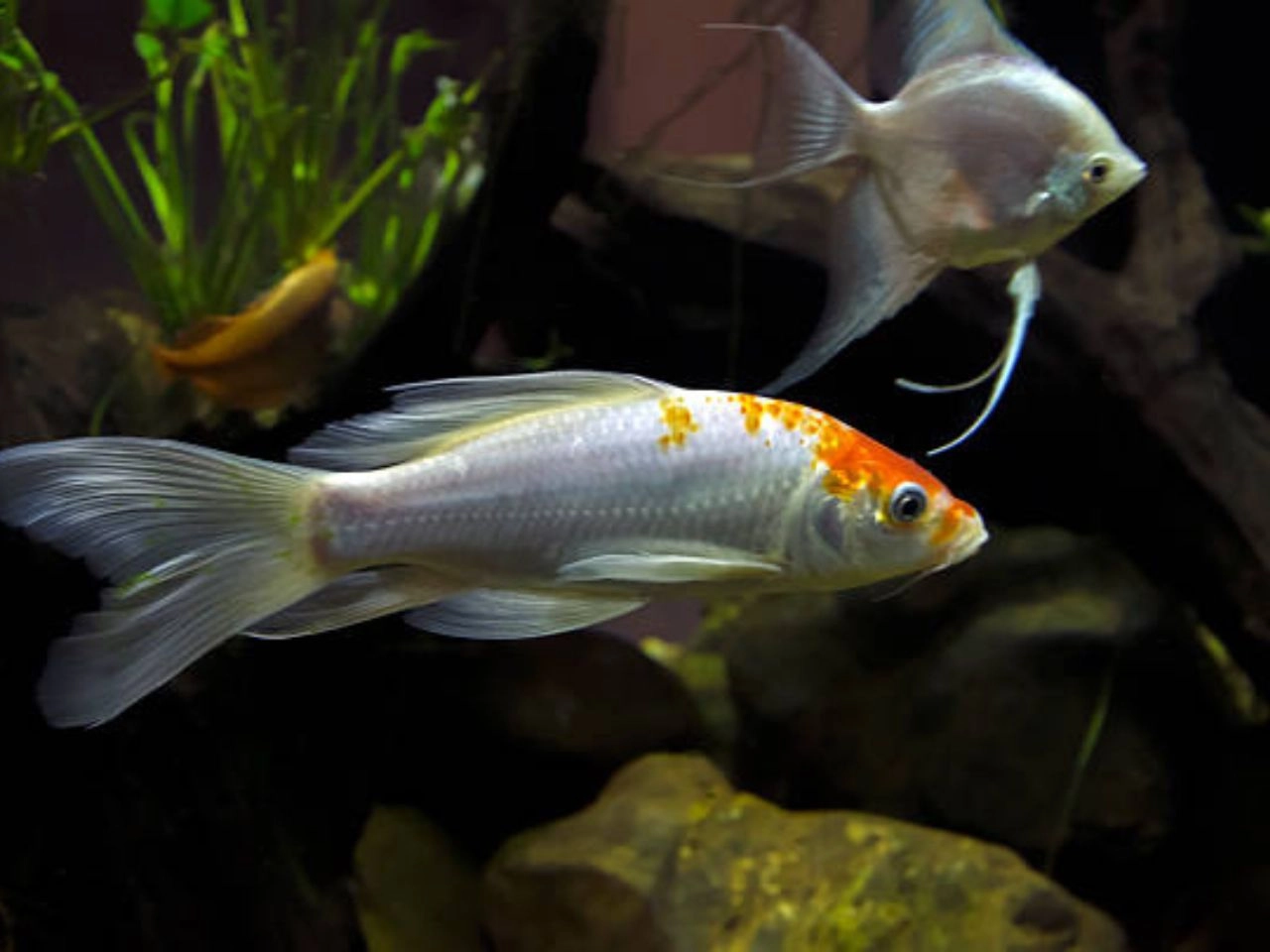Feed a Betta fish once or twice a day. Overfeeding can harm their health and water quality.
Betta fish are vibrant and popular pets, cherished for their striking colors and flowing fins. Proper feeding is essential to maintain their health and vitality. Offering food once or twice daily ensures they receive the necessary nutrients without overfeeding. Overfeeding can lead to obesity, bloating, and degraded water quality, which poses risks to their well-being.
Betta fish have small stomachs and require only a few pellets or flakes per meal. Regular feeding schedules help establish a routine and keep your Betta happy and healthy. Always remove uneaten food to prevent water contamination. Balancing their diet with occasional treats like frozen or live food can enhance their nutrition.
Betta Fish Care of How Often to Feed a Betta Fish

Betta fish, also known as Siamese fighting fish, are popular pets. They are known for their vibrant colors and flowing fins. To ensure your Betta fish thrives, you need to understand their care requirements.
Habitat Preferences
Betta fish thrive in warm water. The ideal temperature range is between 76-82°F (24-28°C). Use a heater to maintain this temperature. They prefer a tank size of at least 5 gallons. Smaller tanks can stress them.
Betta fish also need clean water. Use a filter to remove waste and toxins. Change 25% of the water weekly. This helps maintain water quality. Betta fish-like hiding spots. Add plants and decorations to their tank.
Dietary Needs
Betta fish are carnivorous. They need a protein-rich diet. Feed them high-quality Betta pellets. These should be the main part of their diet. You can also give them treats like brine shrimp or bloodworms.
It’s important to avoid overfeeding. Feed your Betta fish once or twice a day. Only give them as much as they can eat in 2 minutes. Overfeeding can cause health issues.
Here’s a simple feeding schedule:
| Time | Amount |
| Morning | 2-3 pellets |
| Evening | 2-3 pellets |
The Betta Fish Diet
Feeding your Betta fish the right diet is essential for its health. Bettas have specific dietary needs that must be met. A balanced diet helps them stay active and vibrant. Understanding what to feed them can make a big difference.
Protein-rich Foods
Bettas are carnivorous fish. They need a diet high in protein. Protein-rich foods are vital for their growth and energy. Some great options include:
- Bloodworms
- Brine shrimp
- Daphnia
These foods mimic what they eat in the wild. They provide essential nutrients and keep your Betta healthy. Always ensure the food is fresh and clean.
Commercial Betta Pellets
Commercial Betta pellets are specially formulated for Bettas. They offer a convenient feeding option. These pellets usually contain the necessary nutrients. Look for high-quality pellets with the following features:
- High protein content
- Added vitamins and minerals
- Minimal fillers
Pellets should make up the bulk of your Betta’s diet. They are easy to store and feed. Avoid overfeeding by following the instructions on the package.
Live Food Options
Live foods are a great treat for Bettas. They provide enrichment and stimulate natural hunting behavior. Some excellent live food options include:
- Live brine shrimp
- Microworms
- Infusoria
Live foods can be more nutritious than frozen or dried options. They also help keep your Betta entertained. Ensure the live food is safe and free from parasites.
Betta Feeding Frequency
Understanding the feeding frequency for your Betta fish is crucial. This ensures that your Betta stays healthy and active. Overfeeding or underfeeding can lead to health issues. Let’s dive into the right feeding schedule for both adult and juvenile Betta fish.
Adult Betta Feeding Schedule
Adult Betta fish thrive on a consistent feeding schedule. Feed them twice a day. Morning and evening are the best times. Ensure each meal consists of only a few pellets or pieces of food.
- Morning: 2-3 pellets
- Evening: 2-3 pellets
Overfeeding can cause bloating and other health problems. Always remove any uneaten food after 5 minutes. This prevents water contamination and keeps your Betta healthy.
Juvenile Betta Considerations
Juvenile Betta fish require more frequent meals. They are growing and need extra nutrients. Feed them three to four times a day. Each meal should be smaller than for adults.
- Morning: 1-2 pellets
- Midday: 1-2 pellets
- Afternoon: 1-2 pellets
- Evening: 1-2 pellets
Ensure to observe their growth and adjust the feeding amount if necessary. Always provide high-quality Betta food to support their development.
Understanding Betta Fish Hunger Signals
Understanding your Betta fish’s hunger signals can help ensure they are fed properly. It is important to observe their behavior and physical condition to determine if they are hungry.
Behavioral Cues
Betta fish show certain behavioral cues when they are hungry. These cues can help you know if it is feeding time.
- Swimming near the surface: Hungry Betta fish often swim near the surface. They look for food there.
- Begging behavior: They may come to the front of the tank. This is a sign they are expecting food.
- Increased activity: They become more active and swim around more. This can be a sign of hunger.
- Inspecting the bottom: Sometimes, Betta fish look for leftover food at the bottom. This can indicate they are hungry.
Physical Indicators
Physical indicators can also tell you if your Betta fish is hungry. Observing their body can provide clues.
- Sunken belly: A Betta fish with a sunken belly is likely hungry. This is a clear sign they need food.
- Weight loss: Noticeable weight loss over time can indicate they are not getting enough food.
- Color changes: Dull colors can sometimes be a result of poor nutrition. A hungry Betta fish may lose its vibrant colors.
By understanding these behavioral cues and physical indicators, you can better manage your Betta fish’s feeding schedule. Regular observation is key to keeping your Betta fish healthy and happy.
Common Feeding Mistakes To Avoid
Feeding your Betta fish correctly is crucial for their health and well-being. Knowing how often to feed them is important, but avoiding common feeding mistakes is just as vital. Below, we discuss some of the most frequent feeding errors Betta fish owners make and how to avoid them.
Overfeeding Consequences
Overfeeding is one of the most common mistakes Betta fish owners make. When Betta fish are overfed, it can lead to several problems:
- Poor Water Quality: Excess food breaks down and pollutes the water.
- Obesity: Overfeeding can cause Betta fish to become overweight.
- Constipation: Too much food can lead to digestive issues.
Feed your Betta fish small portions twice a day. Remove any uneaten food after a few minutes to keep the tank clean.
Underfeeding Issues
Underfeeding is another common mistake. Betta fish need enough nutrients to stay healthy. Underfeeding can cause:
- Malnutrition: Your Betta fish may lack essential vitamins and minerals.
- Weak Immune System: A lack of proper nutrition can make them more susceptible to diseases.
- Reduced Activity: Betta fish may become lethargic without enough food.
Ensure you provide a balanced diet with a variety of foods, including pellets, flakes, and occasional treats like brine shrimp or bloodworms.
Feeding Techniques For Betta Fish
Feeding betta fish properly is crucial for their health and well-being. Betta fish have specific dietary needs and require the right amount of food at the right times. This section covers the best feeding techniques to ensure your betta fish thrive.
Portion Control
Proper portion control is key to maintaining the health of betta fish. Overfeeding can lead to obesity and other health issues, while underfeeding can cause malnutrition.
Feed your betta fish small amounts twice a day. A good rule is to feed only what they can eat in two minutes. Betta fish have small stomachs, about the size of their eye.
Use a feeding schedule to keep track of meal times and portions. This helps ensure consistency and prevents overfeeding.
Feeding Tools And Methods
Using the right feeding tools and methods can make feeding your betta fish easier and more efficient.
| Tool | Purpose |
| Feeding Ring | Keeps food in one place |
| Feeding Tongs | Helps place food accurately |
| Automatic Feeder | Ensures timely feeding |
Feeding tongs allow you to place food directly in front of your betta fish. This ensures they get the food without it sinking to the bottom.
For those with busy schedules, automatic feeders can be a great tool. These devices dispense food at set times, ensuring your betta fish are fed regularly.
By following these techniques, you can ensure your betta fish get the right amount of food and remain healthy.
The Role Of Fasting In Betta Fish Health
Betta fish are stunning creatures with unique needs. Feeding is crucial, but so is fasting. Fasting can benefit their health and improve their well-being. Knowing how to fast your Betta fish safely is essential.
Benefits Of Intermittent Fasting
Intermittent fasting can help Betta fish in many ways. It mimics their natural environment where food is not always available. Here are some key benefits:
- Improved Digestion: Fasting allows their digestive system to rest.
- Reduced Risk of Obesity: Helps maintain a healthy weight.
- Enhanced Longevity: Promotes a longer, healthier life.
Implementing Fasting Safely
Fasting your Betta fish should be done carefully. Follow these steps to ensure their safety:
- Choose the Right Day: Pick one day each week for fasting.
- Monitor Their Behavior: Watch for signs of stress or illness.
- Resume Normal Feeding: Feed them normally the next day.
Implementing fasting in your Betta fish’s routine can enhance their overall health. Remember to observe them closely and make adjustments as needed. This simple practice can lead to a happier, healthier Betta fish.
Adjusting Feeding Schedules For Health Issues
Adjusting feeding schedules for your Betta fish is crucial, especially when health issues arise. The right feeding schedule can make a significant difference in your Betta’s health and longevity. Let’s explore how to handle feeding adjustments for various health concerns.
Dealing With Digestive Problems
Betta fish often face digestive problems like bloating and constipation. These issues can be due to overfeeding or poor diet. To prevent these problems, feed your Betta in small amounts twice a day. Ensure you use high-quality, pellet-based food.
If your Betta shows signs of bloating, try fasting for one day. This helps clear its digestive system. After fasting, feed it a pea. Boil a pea, remove its skin, and chop it into tiny pieces. This natural remedy can aid digestion.
Avoid feeding your Betta too many treats. Bloodworms and brine shrimp are treats, not daily food. Stick to a balanced diet to keep digestive issues at bay.
Appetite Changes
Betta fish might lose their appetite due to stress or illness. If your Betta refuses food, first check its environment. Make sure the water is clean and at the right temperature.
Stress can also affect appetite. Provide hiding spots and reduce noise around the tank. If stress is the cause, your Betta’s appetite should return soon.
If illness is suspected, observe your Betta’s behavior closely. Look for signs like lethargy or unusual swimming patterns. Consult a vet if necessary.
Sometimes, Betta fish get bored with the same food. Rotate between high-quality pellets, flakes, and frozen foods. Variety can stimulate their appetite.
| Health Issue | Feeding Adjustment |
| Digestive Problems | Feed twice daily, fast one day a week, and use boiled peas |
| Appetite Changes | Check environment, reduce stress, offer varied diet |
Seasonal Adjustments In Betta Feeding
Betta fish feeding needs to change with the seasons. Understanding these adjustments ensures your fish stay healthy. Learn about winter concerns and summer strategies for betta feeding.
Winter Concerns
Winter brings lower temperatures. Betta fish become less active in the cold. Their metabolism slows down.
Feed your betta less during winter. Aim for 2-3 times a week. Use high-quality food for better nutrition.
Consider using a water heater. Maintain a stable temperature of around 78°F. A consistent environment keeps your betta healthy.
Monitor your betta’s behavior. Reduced activity is normal. But, if your fish seems stressed, check water conditions.
Summer Strategies
Summer means warmer water. Betta fish become more active. Their metabolism speeds up.
Feed your betta daily in summer. Offer small portions to avoid overfeeding. Use a mix of pellets, flakes, and frozen food.
Maintain clean water. Warmer temperatures can lead to faster bacterial growth. Regular water changes are essential.
Keep an eye on the water temperature. Betta fish thrive in water around 78°F. Too hot water can cause stress and illness.
Monitoring Betta Fish Health Through Diet
Keeping your Betta fish healthy involves more than just feeding them. Monitoring their health through diet is crucial. A balanced diet helps Betta fish thrive. It ensures they have the energy to stay active. Proper feeding also boosts their immune system.
Water Quality And Feeding
Water quality plays a vital role in a Betta fish’s health. Poor water conditions can lead to stress and disease. Always check water parameters before feeding. Use a reliable water test kit for this purpose.
High-quality water ensures your Betta fish can digest food properly. Dirty water can cause digestive issues. Clean the tank regularly to maintain good water quality. Change 25-50% of the water weekly.
Here is a simple table to guide you:
| Water Quality Factor | Optimal Range |
| pH Level | 6.5 – 7.5 |
| Ammonia | 0 ppm |
| Nitrite | 0 ppm |
| Nitrate | < 20 ppm |
Signs Of Nutritional Deficiencies
Nutritional deficiencies can impact your Betta fish’s health. Watch out for signs like:
- Lethargy: Your Betta fish may become less active.
- Color Fading: Bright colors may become dull.
- Fin Rot: Fins may appear torn or decayed.
- Loss of Appetite: Betta fish may refuse to eat.
If you notice these signs, adjust their diet. Provide a variety of foods. Include high-protein options like bloodworms and brine shrimp. Avoid overfeeding to prevent obesity and other health issues.
Advanced Betta Feeding Tips
Feeding your Betta fish properly ensures it stays healthy and vibrant. Once you master the basics, you can explore advanced feeding tips to boost your Betta’s diet. These tips focus on live prey and supplemental nutrients to keep your Betta thriving.
Live Prey Feeding
Live prey provides essential nutrients that dry food can’t match. Feeding live prey stimulates your Betta’s natural hunting instincts. Common live prey options include:
- Brine Shrimp: These are high in protein and easy to digest.
- Daphnia: They act as a natural laxative, preventing constipation.
- Bloodworms: These are nutrient-rich and highly appealing to Bettas.
Feed live prey in moderation. Overfeeding can cause water quality issues. Aim to feed live prey 2-3 times per week. Ensure the prey is small enough for your Betta to eat comfortably.
Supplemental Nutrients
Adding supplemental nutrients ensures your Betta gets a balanced diet. Supplements can fill the nutritional gaps left by standard fish food. Consider these options:
| Supplement | Benefits |
| Vitamins | Boosts the immune system and enhances color. |
| Minerals | Supports bone and scale health. |
| Probiotics | Aids in digestion and nutrient absorption. |
FAQ(How Often to Feed a Betta Fish: Essential Guide)
Do You Have To Feed Betta Fish Every Day?
Yes, feed your betta fish once or twice daily. Overfeeding can lead to health issues. Use high-quality food.
How Long Can Betta Fish Go Without Food?
Betta fish can go without food for up to 14 days. It’s best to feed them regularly to ensure their health.
Can You Overfeed A Betta Fish?
Yes, you can overfeed a betta fish. Overfeeding can lead to health issues like obesity and bloating. Feed them small amounts twice daily.
Can You Skip A Day Feeding Betta Fish?
Yes, you can skip a day feeding betta fish. They can go without food for a day or two.
Feeding your Betta fish properly ensures its health and happiness. Stick to a consistent schedule, avoiding overfeeding. Use high-quality food and observe your Betta’s behavior and health. Following these guidelines will help you keep your Betta fish vibrant and thriving.
A well-fed Betta fish is a joy to watch and care for.




